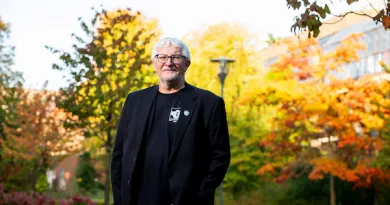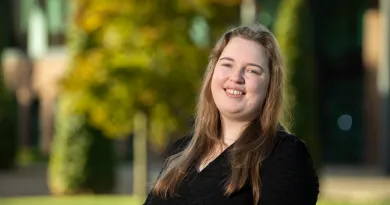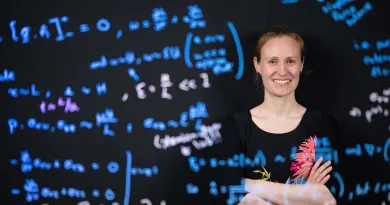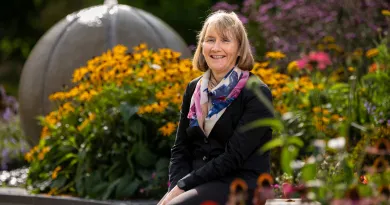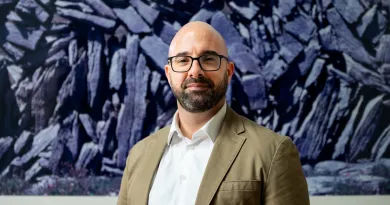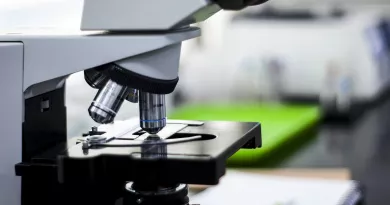Stephen Kinsella is Professor of Economics, Head of the Department of Economics, Co-Director of the UL's Immersive Software Engineering programme, and Research Associate at the Rhodes Centre for International Finance at Brown University.
His broad research areas are Macroeconomics, Economics for Business, Financial Economics, and has a keen interest in smart cities, new regional collaborations, economic networks, and in bringing thinking around natural capital into mainstream economic thinking.
Stephen is a member of the Irish Government's AI Advisory Council and an Economic Advisor to the Tánaiste, Simon Harris. He is a regular columnist across media organisations in Ireland, Europe and America and has twice been named Economic Commentator of the Year for his media work.
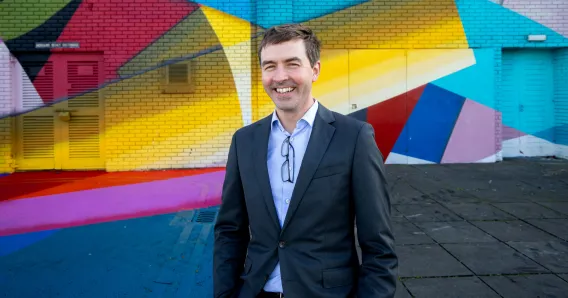
You get satisfaction from having an idea and making it real. Ideas are like elbows. Everybody's got them. What matters is making the idea real, implementing the idea in some way. It can be a mathematical model, it can be a simulation, it can be a project, it can be an experiment, but you make an idea real using the discipline knowledge that you have.
Stephen Kinsella, Professor of Economics, explains how economics just might be the key to overcoming real-world problems in a sustainable way.
I'm an economist, which means I study society. I study how people interact with one another, and I guess the most important thing that we can do as researchers right now is think about how to create a more sustainable future. What I'm doing to be a small part of that in Limerick City is putting together a suite of smart society research projects, which actually asks people how they want to decarbonise, how they want to do the climate transition and how we as researchers, but also as the state, can actually help individuals and businesses decarbonise and save money on their energy bills and just generally live a better life.
Posing the right question
Being a researcher means knowing how to ask a specific kind of question. So you say, what would it look like if it was like this? You say, I am really curious about this area and I really want to get into it. And I have a specific way of doing that. And that's a really important point that as a researcher, what you learn in your training is how to ask these questions in a very specific way. And often we will delineate disciplines depending on how they ask certain questions. A sociologist might ask the same question as an economist, but get to a different answer. They use a different path. An engineer might ask the same question as an architect, but they'll get to the same place, but they'll take a different path. Being a researcher for me is about having the freedom to ask an ambiguous question.
You don't know the answer of the question that you're asking. It's the entire point of research, and then you find out something about the world and that's brilliant. That's really, really exciting. Before you asked the question, before you went through the years of trying to come up with an answer, no answer existed and now one does, and that's incredibly satisfying. It's sort of like building a wall and you've built this wall and at the end you look back and then the wall is built and there's a deep satisfaction from doing that. And I've been doing this now for 25 years and I don't particularly plan on stopping.

It's almost like you're building knowledge. That's the analogy with the wall. So you're building knowledge, things that we didn't know.
You're building each individual brick and you add a little bit and then the next person comes on, adds a little bit, and the next person comes on and adds a little bit. And as you do so, you end up adding to different kinds of conversations as well. Twenty years ago when I started doing this kind of stuff, people spoke about decarbonisation in a very specific way. The idea was we would simply impose the best technological solution on people and they would go, oh yes, you're the great researcher.
You know what to do. The reality is people have opinions, and they don't necessarily want somebody saying, we have the answer for you. You want the citizen to actually give you their view, and you want the citizen to in fact innovate themselves. You want the citizen to come up with a better idea than you have.
A lab but not what you think
And that's why we have the Citizen Innovation Lab. The Citizen Innovation Lab in Limerick City is a partnership between the University of Limerick and Limerick City and County Council, where we created a space digital and physical that people can come and talk about how they want to improve their own situations with respect to climate and sustainability.
It's not just the state and the university and the council giving the citizen the solution. The citizens themselves are giving us the solutions and we're working with them and their community groups to create bespoke projects that work specifically for them, and they're taking ownership of the idea of decarbonizing. And that's really exciting because 20 years ago that wouldn't have existed. That concept wouldn't have existed, and now it does. And it doesn't just exist on some scientific library journal. It doesn't exist in some database somewhere. It exists in the real world in Limerick City today.
Play to your strengths
I'm really, really good at setting my own direction and a career in research allows you to do that. A career in research allows you to construct a version of the world for yourself that you can simply ask questions that you care about. And the beauty and the privilege of a job at University of Limerick is that you're given the freedom and space to be able to do that. It's not a small thing. There are very few people who get to be as free as self-directed as researchers are.
I am genuinely curious about everything. It's a disaster. Disaster. I would love to be mono focused, but I'm not at all. I'm very broad focused. I'm always asking why is something like that? Always, I'm relentlessly curious about the world in a deeply annoying degree, if I'm being perfectly honest. Most people I know I annoy lots of people because I'm always asking, why is that like that? When you are asking why is this like this? Why do we design buses the way we do? Why do we generate power systems the way we do? Why is a system of power relations the way they are in society? You're asking a scientific question why?
And the answer very often, well, if you're being honest, a lot of the time the answer is the reason is it was like it was yesterday. That's not a really good reason for anything.
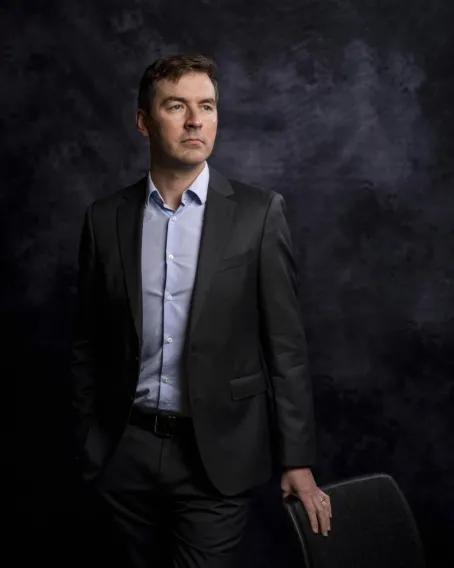
So I choose to kind of push at these things and I have spent my whole career designing new research programmes, designing new courses, writing books, writing articles, writing speeches, giving courses and everything else, just constantly asking why. The really interesting thing about economics is the answer changes unlike in physics or chemistry. If you ask why did those two atoms bond the way they do, you can get to a close room and closer and closer answer. In economics and most social sciences, the question says the same and the answers change. And that's a beautiful thing to think about as well.
The world in threes
There are only three problems really to solve in social science, climate change, migration, and ageing. Of those three, climate change is the one that's most amenable to technological solutions, and it's the one that's most pressing. If you want to think about the future of a city, you have to think about the future of a city in terms of climate change. What does it mean for the people of Limerick today? I'm not going anywhere. Limerick isn't going anywhere. It's very important that we situate climate change in its local context, and that's why I'm so focused on thinking about this in this way.
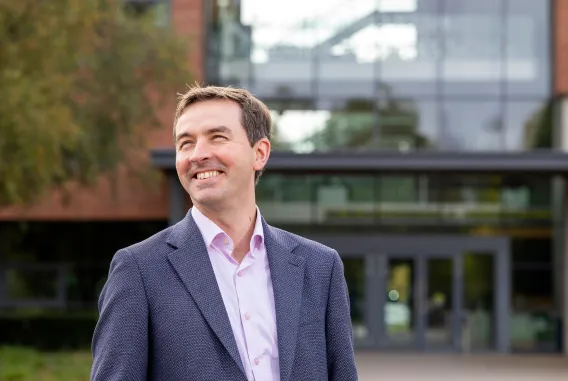
What does smart mean?
Smart society means different things depending on who you ask, which is a very researcher way of saying it. What it used to mean when the term came from the scientific literature and smart society meant that we would take data from different sources, say pollution levels from roads, installation levels. We would take different data sets from different parts of cities and people and we would say, oh, based on this data, you should change your behaviour, or we should give you a grant to insulate your home, or we should put in electric buses to reduce the pollution and so forth. So using the data to feed back to society, to change things and make things better. That's the basic idea of a smart society using data in a well-governed way so that we're not stealing people's data and that kind of thing, but using data to feedback and make people's lives better. That's how it began.
What it is now, it's kind of a corporatised buzzword, and that's fine. That's how all terms go, but it can mean everything from your fridge talking to you to the government, having massive amounts of data on you, and it has all the promise and all the peril of those things because data is power, and when you hand your data to somebody, you hand power to them. And it's a very important point that privacy researchers, some of whom I work with, have thought carefully about.
A smart city uses your data and other people's data to really understand behaviour and to change behaviour. This is the most important thing. The more data we use and the better we target it to people conditional on their privacy, of course, the better it's going to be for everybody. You'll have smarter, more sustainable solutions, you'll have smarter, more sustainable traffic, you'll have smarter, more sustainable buildings, and then you will have a more sustainable life.
I'm going to use the example of buses. So a bus is driving up a street and is emitting carbon that is being tracked by carbon monitors on buildings. We know that the bus is polluting to a certain degree. We also know where the bus is so we can tell you when the bus is going to arrive at a certain point. We know how full the bus is, we know where the bus is going. We know how much fuel the bus is going to use. When you take these different data sets into account and you mash them all together, you have a programme for a better society because you can make sure the traffic volumes move faster. You can also change the bus itself, make it greener. You can make sure that people know and have confidence in public transport. And when you do all these things, you're allowing the data of the city to flow back into people and change their lives, change businesses, behaviours.
If you know a bus is going to stop outside, maybe you change the menus on your shop to make it more attractive to customers and so forth. And it becomes a self-reinforcing loop where better options become available for people and they live a more harmonious and more importantly, more sustainable life. So I will take a bus if I know for sure it's going to be there when I need it. I won't take it if it's not. And those are the kinds of changes that we need to see happen because we know driving cars, everybody into the future is not the sustainable solution.
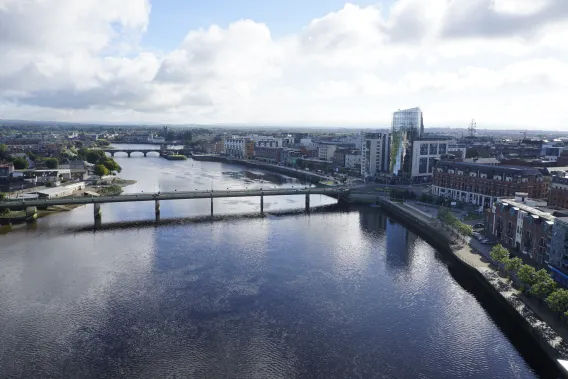
I know I'm biased, but economics is probably the most important social science subject because it's a way of giving advice to the powerful. And it's a way of reminding everyone that we have constraints. We don't live within a planet that is unbounded in resources. We don't live within a world where everyone can get everything that they want. And so economics reminds us constantly that we have to make these choices and we even by not doing anything, we're making these choices. And it's really, really important that we find better ways to present these choices to people. We are not the ones who make those choices.
We are simply the ones who hand the hand decision makers these choices. And it's really important because when economists make mistakes, millions of people suffer. Millions of people suffer. It's an incredibly important discipline to study. I take, the reason I study economics is because when economists make mistakes, millions of people can suffer. If you do it properly, millions of people can prosper. I choose to try to study this stuff in a way that really helps people on the ground, and I'm really privileged to be able to do so.
Better in numbers
Economics alone is not going to get you to a smarter society. You need to work with architects, you need to work with engineers, you need to work with marketing professionals, you need to work with civil servants, you need to work with everybody. Essentially, you just bring one tiny slice of the pie, and it's an important slice. I believe it's the best slice, but it's not the only slice. And working across disciplines is very hard because you might say the same word, but you mean totally different things because your disciplines come from different places. You might be staring at the same thing, but see two totally different versions of that thing. And so dialogue is really important. Trust is really important. Mutual respect is really important. It's important that you look at an architect's way of seeing the world and consider that equally valid to an economist or an engineers and so forth.
And each discipline brings something special, something unique, something extraordinarily valuable. And no one discipline is better than another, I suppose, although economics probably is. But no one discipline is better. Fundamentally, what is true is if you focus on what you intend to achieve, which is a better limerick city for the people of Limerick City, it's quite easy then to work with one another. And we've been really successful in getting Horizon Europe grants, SEAI grants, EPA grants many other kinds of grants in order to support our joint research. And that's been really good. And we don't plan on stopping.
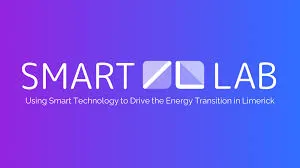
If we just think about one specific example. SmartLab Limerick is an SEAI-funded project to put 100 smart sensors into people's homes in Limerick city. The idea is to get data from people's homes and give them back actionable things that they can do to reduce their energy usage, reduce their energy bills, make their homes warmer, and figure out how best to do this not just in Limerick, but across all of Ireland and across the world. Limerick is what's called a lighthouse city for decarbonisation across Europe. And it's really important that the lessons that we learn in Limerick, we spread to the rest of the world. And that's the kind of impact that I want to have now and into the future.
Ideas are like elbows
You get satisfaction from having an idea and making it real. Everyone has ideas. Ideas are like elbows. Everybody's got them. What matters is making the idea real, implementing the idea in some way. It can be a mathematical model, it can be a simulation, it can be a project, putting sensors into people's homes. It can be an experiment, but you make an idea real using the discipline knowledge that you have. And I think the way that I think about it, the thing that excites me is the fact that we're never going to finish. It's always going to be new. It's always going to be interesting. And that kind of constantly evolving conversation. And maybe there are colleagues in the Positive City Exchange in Trondheim, Norway that have done it better, we'll take that, improve it, try to localise it. Maybe there's colleagues in Saudi Arabia that are doing it better, we'll take that, try to improve it and so forth. The conversation evolves and it's always a conversation of, Hey, I did this. Here's what was good, here's what was bad. You should have a go. And to the extent that you can be part of that conversation, it's a great way to live because whatever you're doing, you're adding to the corpus of human knowledge, and that's a pretty good way to spend a life.
I'm most proud of the relationships that I have with the people who I get to continually ask these questions with. These are relationships that have now lasted decades, we're mates. It's just a lovely way of working and I really look forward to doing it in the future.
We're currently deploying SmartLab, so we haven't got any data back yet from it, so fingers crossed people will enjoy it. But we have had lots of interactions via the Positive City Exchange project with people. We know that the interventions work. We know that simply giving people a voice and supporting them and actually decarbonising really works. We know that when we build these things, people will take them and make them their own. And that's really exciting. It's something that, something that is tremendously satisfying to see and practise. We had members of the European Commission over here, and we were showing them some of the work that's been done by a community group in Garryowen, Limerick. And they were blown away by how innovative these lay laypeople were in just deciding what they were going to do for their community and supported by the City Exchange Project and by Limerick City and County Council and by UL.
They made their community more sustainable. And that is a model for all of Europe.
I mean, the most amazing thing about the Garryowen project is none of these people thought that they could do that stuff. But yeah, the guys in the Fab Lab were incredible working with them.

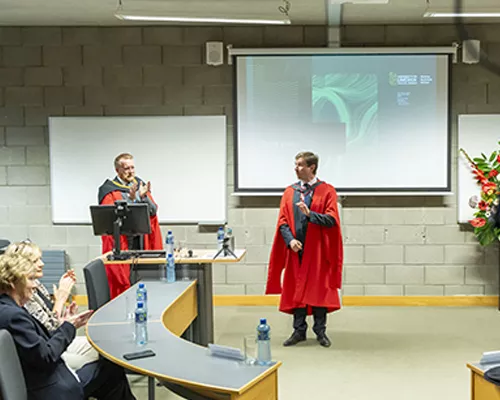
…and then it just clicked
I can still remember the day. It was February 11, 2006, and it was about 4.30 in the morning, and I had been working all night on a paper. It was part of my PhD. I was in the basement of the Bobst Library in New York, and I couldn't figure out this problem. And I had spent weeks trying to work on it. And it was only after I gave up and I spoke to somebody about it, and I gave them my problem. They said, oh, it's like this. They saw it in a totally different way, and by hearing their description of it, I went, that's right. And I went back and I wrote that chapter, that chapter of my PhD became a book. And that book became the foundation for a field, which is really cool. And it's very nice to email people, email me and say, oh, I've built the Italian version of this model and I've built the Austrian model version of this model and so forth.
And that's deeply, deeply satisfying, but it's a tiny little piece of a brick in the overall wall, but it's really nice to have it done. But I can still remember the moment when I went, right, yeah, okay. It has to be like this. There's no point in me explaining what it is. But it was very, very, very cool. It was a lovely moment, and it became the foundation for my academic career. And it really was after a series of all-nighters and being very sleep deprived and also under extreme pressure, I recommend extreme pressure to people, particularly when they're young.
Getting support is key
Mentoring has been incredibly important to me in my career. I wouldn't be here today without the mentors that I've had, some of whom don't even know that they're mentors, some of whom have been my formal mentors, my PhD advisors and so forth, some of whom have been senior colleagues, some of whom I just look at them and I go, I'd love to be like you. And I learned from watching them, and they don't even know that they're mentors of mine. But I have modelled my career on others, I have learned from others. I have gotten seriously positive and negative feedback from others. And now I am a mentor and I try to distil what I've learned both positively and negatively and give that back to people. It's something I take incredibly seriously. It's a really big part of my job now, and it's something that I hope to be able to continue to do fundamentally. You don't advance in this world unless you have good mentors. And if you are watching this and you don't feel like you have a good mentor, give me a shout. Thank You.
I think the reality of mentorship is it's a personal connection that you make with one person, or you may not even know them, but you might be learning from them. But UL tries to develop its staff as best it can, but it is itself always learning. And I think it's important to be open about that. The more we do of this, the better we get at it. The more we add to the mentorship journey, the better it becomes. And it is itself a process that the organisation is learning and applying and then learning and applying, and we kind of never get there. But that's not a bad thing.
I came here for a job. I came here to work in the economics department, and I've been here for 17 and a half years. UL has given me a tremendous career. I've been really privileged to how hold the roles that I've held and continue to hold, and it's just a great place to work. It's a privilege to be able to teach thousands of students every year. It's a privilege to be able to work with my colleagues. It's a privilege to be able to wake up in the morning and direct my day. And I think I more people should have this privilege. I feel like I've had an incredible career so far. And yeah, I recently had a moment where I had to look back and explain to people, including my mother about how I got here. And it's difficult. You have to bolt a nonlinear narrative into a linear story, and I don't believe that such things are true. But the reason that I'm here, the reason that I'm here now is not the reason that I came. I'm here now. I choose to be, I have many options, but I choose to stay here because UL is the place where I get to ask interesting questions with interesting people and find out interesting answers.
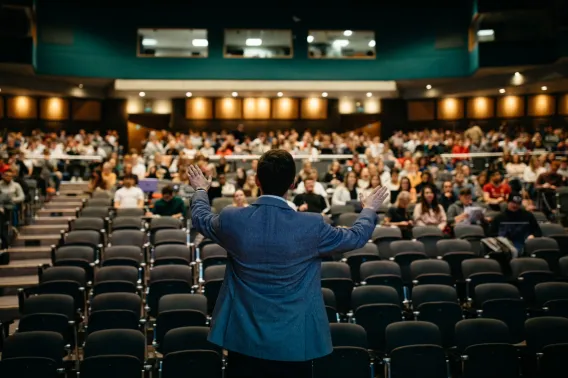
You don't get anywhere unless you're well supported. UL is incredible with its research supports. The most important thing is when I have a problem, I just pick up the phone and I go, oh my God, I have this problem. And they go, don't worry. Calm down. We'll fix it. And you're well supported in your department, you're well supported in your faculty, you're well supported by the research office. You are well supported to go out and do what you need to do. And so while the academic is out the front, there's a huge support staff behind them and you don't get to achieve what you might achieve without serious supports. And so my whole career, I've been blessed with really good support. And again, you don't get to where I've gotten without having all that help and all that support, and I've always been grateful and thankful for it.
We’re already a pioneer and a leader. We're (Limerick) already a lighthouse city for Europe. We're already leading the European Network of Living Labs. We're already providing a model for not just Limerick, but Ireland and indeed the world. The question is, can we continue to do that? Can we make the project bigger and better, more ambitious? Can we be more impactful? And the answer to all of those questions is yes. Excellent.
Some final words of wisdom
This is the best job in the world. If you have the talent for it, you are not going to know if you have the talent for it unless you have a go at it. The way to have a go at it is to try to do a little bit of research as an undergraduate or try to get involved as a research assistant, try to do some citizen research, and then you'll see if you like it or not.
And if you do, you'll be very well supported and you'll have an awesome career. Okay, so you recommend it? Absolutely. It is the only job in the world that I could actually do. It's a fantastic job. There are very few jobs I think that would connect with perhaps my personality and my personality type. And I think if you're the kind of person that is a little restless, then research is certainly for you.
Curious about Stephen Kinsella's research
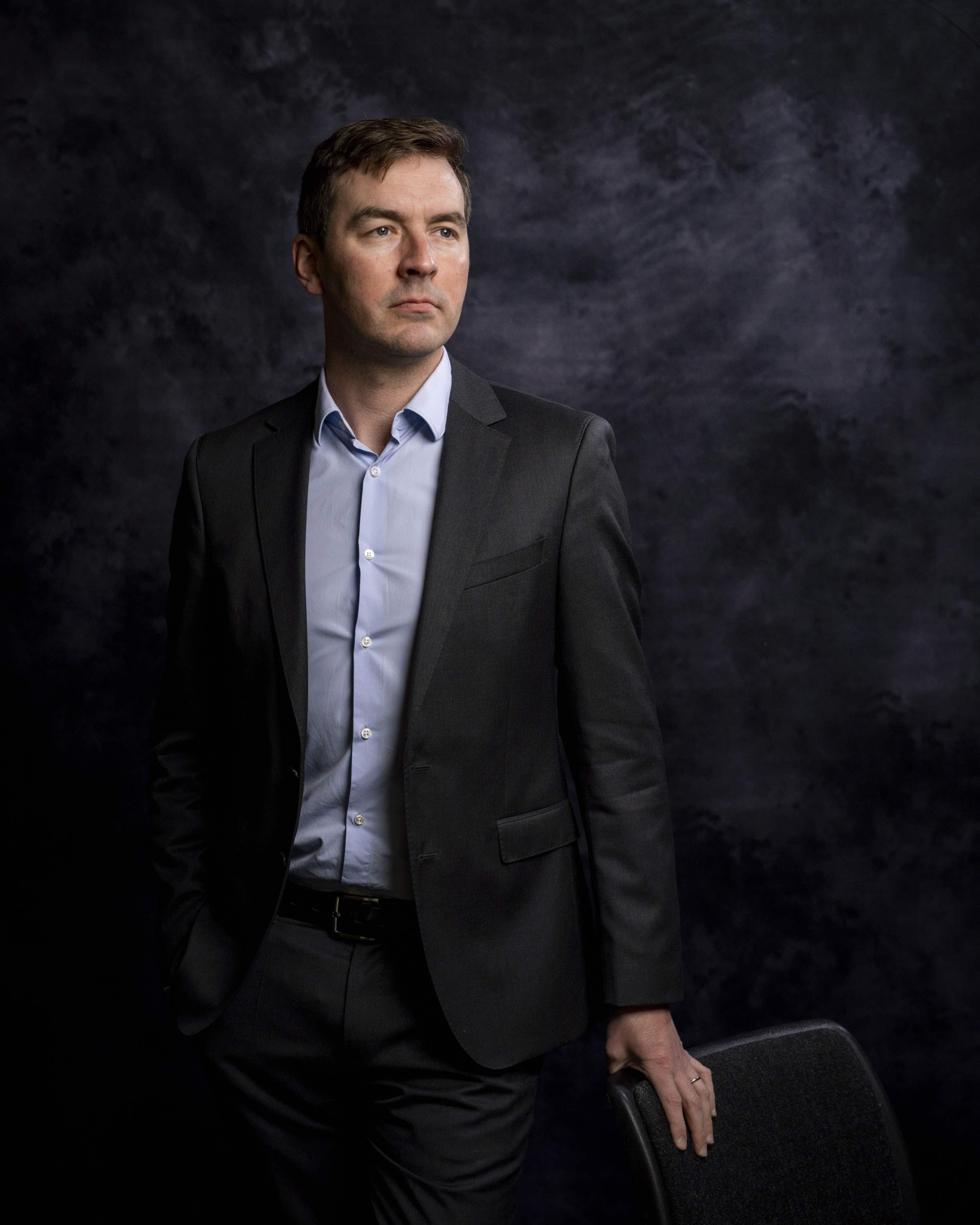
Read about the other researchers helping to change our society
Stay Curious for UL Research
